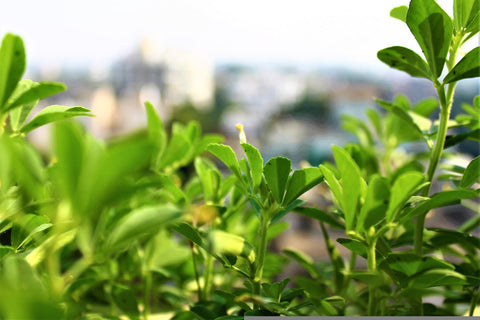Grow and Harvest Fenugreek at Home
Fenugreek is a versatile herb, one you don’t want to miss out in your garden. With its distinctive flavor, aroma, and numerous health benefits, you can effortlessly grow and harvest fenugreek from seeds right at home.

What is Fenugreek
Fenugreek is an exceptional all-purpose herb that’s native to the Mediterranean regions. This annual herb is used extensively in cooking, alternate medicines, cosmetics, spices, and more. In addition, growing fenugreek plants in your garden can also help fix nitrogen in your soil.
Its leaves and seeds are both edible and are used for various purposes. Use fresh leaves straight from your garden for mouth-watering dishes and dry the leaves for use as spices and in medicinal requirements.
How to get Fenugreek Seeds

Looking for quality fenugreek seeds for your container farming or garden? You have come to the right place. We here at Seed World Marketplace offer high-yielding heirloom fenugreek herb seeds that provide the best results. Grab varieties of herb seeds at attractive rates today!
How to Grow Fenugreek from Seeds

Fenugreek is an easy-to-grow herb that can be planted and harvested within a short time. They can be grown directly in the garden or indoor containers or pots.
Find out how to effectively grow and harvest by following fenugreek growing stages.
1. Growing Season:
The fenugreek growing season is between late spring to late summer. This herb prefers warm and humid conditions to thrive.
2. Temperature:
They grow exceptionally well in hot and warm temperatures. Start sowing fenugreek seeds when the average temperature is between 50-90 degrees.
3. Soil Type:
For fenugreek cultivation, prepare soil that contains sandy loam soil with huge quantities of organic matter. Soil pH can be maintained between 6.5 and 8.2.
4. Direct Sow:
Directly sow the seeds in your garden. Avoid transplanting fenugreek seedlings; instead, grow them in indoor containers and pots or use degradable peat pots to transplant them as a whole.
5. Planting Depth:
Plant the fenugreek seeds about 4 inches deep. Seed them densely and cover them evenly with fertile soil.
6. Seed Spacing:
Fenugreek plants can spread for 5-6 inches and grow about 2 feet in height. For this, space your seeds about 6-8 inches apart.
7. Germination Time:
With an ideal temperature of 65 degrees, you can expect germination in 7-10 days.
8. Light Requirement:
Plant your fenugreeks in a sunny area with partial shade. They require daily 4-5 hours of sunlight for healthy growth.
9. Water Requirement:
Water your plant with about 1 inch per week to avoid overwatering. Waterlogged soil can impede the growth of fenugreek plants.
10. Companion Planting:
Grow beans,buckwheat, and chives along with fenugreek plants to harvest diverse herbs and vegetables at the same time.
11. Pests and Diseases:
Like most herbs and plants, fenugreek also comes under danger of certain insects and aphids. Try organic substitutes such as neem oil and insecticides. They are also prone to diseases such as powdery mildew, root rot, and charcoal rot. Combat these diseases by occasional pruning of dead leaves, using drip irrigation systems, and thinning the plants for better growth.
How to Grow Fenugreeks in Containers

Fenugreek seeds can be easily planted and harvested in indoor containers, grow bags, planters, and degradable peat pots.
As they have shallow roots, grow them in wide planters about 6-7 inches deep. Use regular potting soil mix with compost. Spread the seeds evenly with 1-2 inches of spacing. Cover them with a thin layer of soil and drizzle water accordingly. Move your planter or containers to sunny areas with partial shade.
When to Harvest Fenugreek

Harvest fenugreek leaves within 30-40 days from planting. Snip off the top three-fourths of the stems for bushier and continued growth. This can also encourage increased flowering and seed production. After pruning, the fenugreek plants will regrow fresh leaves in 15 days.
How to Preserve and Store Fenugreek Leaves

Want to preserve and store excess fenugreek leaves after your harvest? Not to worry, after harvesting the leaves place them in an airtight container and refrigerate them for later use.
Add them as spices to your cooking or make herbal tea by incorporating fenugreek leaves. The leaves can be sundried in bundles or you can use a dehydrator. Once they turn brittle, separate the leaves from the stems and store them in airtight containers or jars.
Infuse this attractive herb for various purposes by easy methods of planting, growing, and harvesting right at home.
